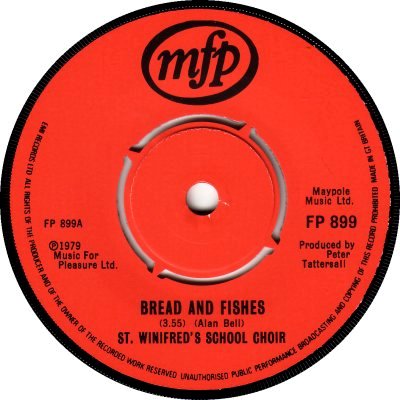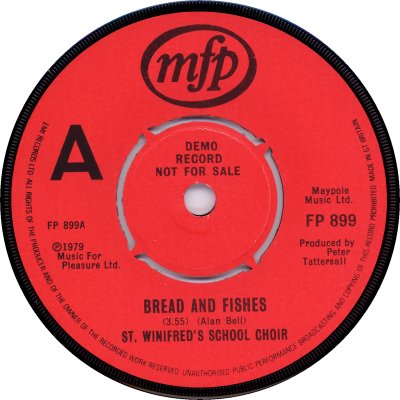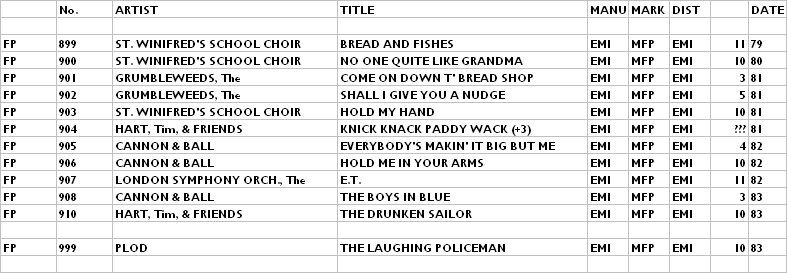

A highly successful budget-price label. MFP - 'Music For Pleasure' - was devoted almost entirely to albums but it issued a dozen singles from 1979 into the '80s and in so doing qualified for a page on this site. Its advent was announced in 'Billboard' of the 4th of September 1965, which described it as a joint venture between EMI and the International Publishing Corporation and said that it was to come under the wing of the Paul Hamlyn Group, an IPC company. According to the article, material for the new label was to come from deleted albums owned by EMI and its licensed labels and also from deleted albums owned by Capitol in the USA. It was to break new ground here: its records would be supplied on a 'Sale or return' basis, with non-selling lines being taken back, deleted and replaced. It would have its own sales force and vans, through which that replacement would take place. Mike Hargood had been appointed general manager, and Richard Baldwyn was on the board of directors - Baldwyn was to play a prominent role in Music For Pleasure down the years. The first batch of releases was planned for October and was intended to consist of seventy-eight albums by the likes of George Shearing, Adam Faith, Stan Getz, Dizzy Gillespie, Judy Garland and Nat King Cole, along with some 'Original Cast' LPs and a generous helping of Classical records - a third of the total.
The new label hit the shops on the 1st of October and proved hugely popular from the off. 'BB' of the 16th of October described the reaction to it as 'Incredible', and said that the company had had advance orders of 500,000 copies across the 78 albums. It added that Disney's 'Mary Poppins' had been licensed and was due for release in December. 'BB' of the 11th of December reported that more than a million Music For Pleasure LPs had been sold in the first seven weeks of its operation and that the whole catalogue was 'Selling like hot cakes'. Much of that success could be attributed to a combination of the low price of the records, 'Unconventional' marketing (including a national advertising campaign) and ready availability of the albums - they were stocked not only in record shops but also in a number of different outlets, including chemists shops, multiple stores, newsagents and even TV rental shops. Chairman Paul Hamlyn came under fire from conventional record companies for taking this approach, but he defended himself by saying that MFP had expanded the market, reaching out to people who would not normally spend money on records. 'BB' of the 9th of July 1966 broke the news that MFP had found yet another outlet, having negotiated an agreement with a nationwide supermarket chain, which the article didn't name. At the very end of 1966 'BB' of the 24th of December reported that not only was MFP continuing to thrive, with 500,000 sales in the previous four weeks, but also enthusiasm for budget-priced records was spreading - Pye's low-price 'Marble Arch' line had shifted more than a million copies of its LPs since September.
The sales figures achieved by MFP releases soon attracted more 'with it' artists to the label. 'BB' of the 1st of January 1967 said that in the wake of an album by 'Hit Parade artists' Cliff Bennett & The Rebel Rousers on MFP selling 500,000 copies the band's manager Brian Epstein had negotiated for the release of LPs by two of his other groups: Billy J. Kramer & The Dakotas and Gerry & The Pacemakers. March 1967 saw Richard Baldwyn being appointed managing director of Music For Pleasure ('BB', 25th March), and the successes continued. 'BB' of the 25th of November was able to report that a deal with MGM had given the company access to material on the American labels Metro and Leo, and in addition it gave some more sales figures. Observing that Paul Hamlyn had intended to sell MFP records 'Like soap' it noted that the tactic was working: 7,000,000 records had been sold over a twenty-five month period, and the company was responsible for 10% of the UK's over-all album sales and 50% of its budget-priced ones.
'BB' of the 25th of May 1968 featured an article by Baldwyn, who gave some details of how MFP worked. Its records - still on 'Sale or return' - were sold from specially designed display units, which were kept topped-up by the company's sales representatives. It had begun to make recordings of its own, and it had access to Disney recordings. Show music, mainly in the form of 'Mary Poppins' and 'The Sound Of Music' - was its best-selling line, and Classical records were responsible for 26% of sales. Baldwyn claimed that there had been a radical change in record buying in the past thirty months, with mass-marketed budget records opening up a new and expanding market. Selling at 13s 11d instead of the 35s or £2 of a full-priced album, they were treated as a high-turnover impulse-buy product. An advert in the same issue pointed out proudly that MFP was 'The best selling LP label in the U.K.'. In passing, it was noted that EMI was responsible for providing material for the albums and for manufacturing them, but that marketing and distribution were done by MFP themselves.
1969 found MFP considering a move into the singles market, albeit in a specialist area. Reporting on the development, 'Record Retailer' of the 9th of August said that a test campaign could be carried out to see if there was a market for cover versions of hits, with the possibility of the first singles appearing by the end of the year. Test marketing was duly carried out the following month, in London and Lancashire, but the first batch of singles didn't come out till May 1970. They were aimed at children, and they had a new label of their own, 'Surprise! Surprise!' (q.v.). Commenting on their arrival, 'BB' of the 23rd of May said that children's records had been responsible for 11% of MFP's sales in 1969. A month later 'BB' of the 13th of June 1970 informed its readers that another new label was in the pipeline: 'Classics For Pleasure' was intended to make its debut in October, with Jack Boyce in charge - Boyce had previously been the manager of Philips's Classical division. CFP would feature some newly recorded product played by the London Philharmonic Orchestra, with tobacco firm Wills underwriting the costs.
The summer of 1970 saw MFP partly under new management, as IPC was taken over by the Reed Paper group. A reorganization took place, with IPC removing MFP from the Hamlyn Group and incorporating it in a new record division along with the new Classics For Pleasure label, under managing director Richard Baldwyn ('BB', 3rd October 1970). 'BB' of the 17th of that month revealed that John Boyden had been appointed product director; it pointed out that he had been with MFP as a producer since 1967 and was largely responsible for the new CFP venture. In the event, the link between Reed and MFP wasn't to last long. 'BB' of the 9th of January 1971 said that EMI was discussing with Reed the possibility of taking full control of MFP and of its sister companies in France, Belgium, Holland and South Africa - there was also a branch of MFP in Australia, but EMI had never had any stake in that and it had always been solely owned by IPC. 'RR' of the same date, being closer to the action, was able to say that a deal had been done; EMI had bought Reed's 50% holding and now owned MFP outright. 'BB' of the 23rd of January put a figure on the purchase: the acquisition had cost EMI £1,000,000.
Having brought MFP on board, EMI created a new company, MFP (Holdings) to control its operations and policy decisions. Joseph Stanford was the chairman of the new company, and Richard Baldwyn continued as managing director. The article in 'BB' of the 19th of June 1971 which announced the appointments confirmed EMI's ownership of MFP in France, Belgium, Holland and South Africa but added Germany to that list as well. In acknowledgement of the boost that MFP and its novel approach had given to record sales, John Fruin of EMI pointed out in 'BB' of the 10th of July that the entire team that had been responsible for the company's success had been comprised of people from outside the record industry. By that point MFP was operating out of premises in Hounslow Road, Feltham, Middlesex; for the first two or three years of its existence it had been located in Russell Street, London WC2. 'BB' of the 11th of November observed in passing that Tesco was among the outlets stocking MFP records; according to the report it had been offered the chance to have its own label but had declined. MFP ended 1971 with a bang, shipping 1,500,000 units to dealers in November - it was the company's biggest sales figure since its creation, and the first time that sales for two consecutive months had been in excess of 1,000,000 ('BB', 18th December).
The idea of putting out cheap singles featuring cover versions of hits, mentioned in 'RR' of the 9th of August 1969, hadn't gone away, and in 1972 it was put into practice. Three such singles were issued on a new label, 'Double Top' (q.v.), but even at a price of 39p sales must have been poor, for the series ended where it had begun. Sales of albums continued to be healthy, and 'BB' of the 29th of June reported that the company had shifted 9.4 million units in the year ending on the 30th of June. By that time budget-priced records had made a big impact - a month before moving to Phonogram, MFP deputy managing director Tony Morris told 'BB' of the 24th of June that budget albums from the various companies were outselling full-price records by 5,000,000 copies yearly. The success brought some problems, and due to a combination of holidays, high demand and EMI moving its factory, MFP struggled to get sufficient LPs pressed ('Music Week', 26th August 1972) - in fact it was forced to cancel its September release supplement ('MW', 7th October). It did however continue to broaden its musical spectrum: in that year it signed agreements with Fly Records for material by The Move, Procol Harum, Joe Cocker and T. Rex ('BB' 24th June), ABC / Dunhill for its mainly-Classical Westminster Gold line ('BB', 15th July), and Probe for a Various Artists 'Spirit Of Rock' sampler ('BB', 9th December).
The widening of the company's interests led to the launch of a couple more new labels in 1973. The one that went on to make the most impact was 'Sounds Superb', which 'BB' of the 1st of September said would feature 'Top names' and would be Pop orientated, leaving MFP to handle the MOR catalogue. The first batch of 25 LPs was scheduled for release in October and would include several originating with Tamla Motown. A second batch was slated for January, and it was intended that others would follow at approximately three-monthly intervals. In passing, the article noted that the company had passed a milestone - it had sold its 50,000,000th album the previous week. The second new label, 'Merry-Go-Round', was said by 'BB' of the 27th of October to be expected to make its debut in November. It was intended to complement 'Surprise! Surprise!' and was to feature stories and lullabies as well as other songs. MFP records continued to be stocked by supermarkets - 'BB' of the 18th of August mentioned the Fine Fare chain as being a customer.
The following few years were less exciting. A revamp of the sales force took place early in 1974, with the separate MFP / 'Surprise! Surprise!' and Classics For Pleasure forces being amalgamated ('BB', 9th February), and in December that year a 'Chart Choice' series was introduced to replace a 'Hot Hits' one which had been discontinued eighteen months previously ('BB', 14th December) - the new series was intended to be more 'Adult', in the sense of MOR rather than naughty. 1975 was quiet, and the newsworthy development of 1976 came when the company undertook its first television sales promotion, with a Christmas advert for albums by Cliff Richard, Vera Lynn, Mrs. Mills, Geoff Love and Mama Cass ('BB', 9th October). MFP branched out into the Spoken Word Cassettes market in 1977 with its new 'Listen For Pleasure' label ('BB', 15th October) and towards the end of that year the death of Bing Crosby sparked a surge in sales of his albums not just for MFP but for the other companies which had access to his back catalogue ('BB', 5th November). Sales of Classics For Pleasure LPs across 1978 hit the 1,250,000 mark, which managing director Baldwyn hoped would increase by at least 250,000 in 1979 ('BB', 14th April 1979).
The most significant development from the point of view of this site came late in 1979, when MFP released the first-ever single on the actual MFP label. Commenting on the development, a company spokesman assured 'MW' readers that MFP had no intention of entering the singles market full time ('MW', 10th November). That first single, 'Bread And Fishes' b/w 'And All The World Sang' FP-899; 11/79), by St. Winifred's School Choir, failed to make much of an impression, but the company and the Choir enjoyed a novelty No.1 with the follow-up, 'No One Quite Like Grandma' b/w 'Pinocchio' (FP-900; 10/80) in the winter of 1980. Ten other singles by MOR artists like Cannon & Ball and The Grumbleweeds followed between March 1981 and October 1983, but there were no more hits. MFP went on to increase its artistic credibility in the early 1980s, when it released albums of old material by The Beatles as a whole and by John Lennon, George Harrison and Ringo Starr as individuals ('BB', 20th September 1980). Another boost came when it launched the 'Fame' label, which featured budget-priced reissues of albums by such famous names as The Stranglers, the Electric Light Orchestra, the Beach Boys and Deep Purple ('BB', 15th May 1982), all on 'Sale or return' terms. In 1995, however, the MFP sales team was integrated into that of EMI, as a result of downsizing and job losses ('BB', 30th September). Finally, the following year, the label was rebranded as 'EMI Gold' ('BB', 20th July 1996).
One label design served throughout for MFP singles. Red labels were the norm (1) but some copies of 'Grandma' had yellow ones. Demo copies, when there were any, were marked in the usual EMI fashion of the time (2). As can be seen, the catalogue numbers of the singles started at FP-899, for reasons which aren't immediately obvious. Manufacture of the singles was naturally by parent company EMI.



Copyright 2006 Robert Lyons.

